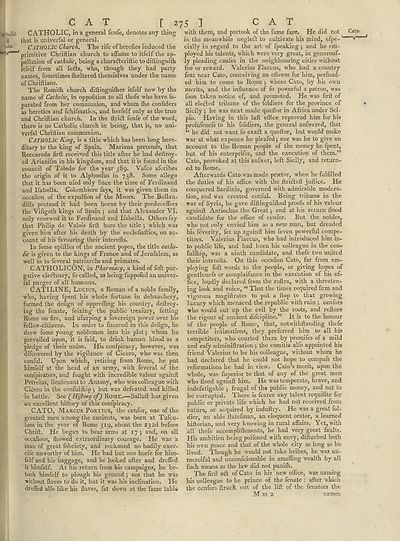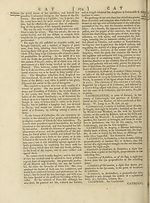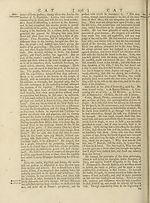Encyclopaedia Britannica, or, a Dictionary of arts, sciences, and miscellaneous literature : enlarged and improved. Illustrated with nearly six hundred engravings > Volume 5, BUR-CHI
(291) Page 275
Download files
Complete book:
Individual page:
Thumbnail gallery: Grid view | List view

((•'lolio
ill
I' iltO.
'-h—1
CAT [27
CATHOLIC, in a general fenfe, denotes any thing
that is univerfal or general.
CATHOLIC Church. The rife of herefies induced the
primitive Chriltian church to affume to itfelf the ap¬
pellation of catholic, being a charadteriltic todiftinguiih
itfelf from all feAs, who, though they had party
names, fometimes Iheltered themfelves under the name
of Chriftians.
The Romifh church diftinguilhes itfelf now by the
name of Catholic, in oppolition to all thofe who have fe-
parated from her communion, and whom Hie conliders
as heretics and fchifmatics, and herfelf only as the true
and Chriftian church. In the drift fenfe of the word,
there is no Catholic church in being, that is, no uni¬
verfal Chrillian communion.
CATHOLIC King, is a title which has been long here¬
ditary to the king of Spain. Mariana pretends, that
Reccarede firft received this title after he had deftroy-
ed Arianifm in his kingdom, and that it is found in the
council of Toledo for the year 589. Vafce afcribes
the origin of it to Alphonfus in 738. Some allege
that it has been ufed only fince the time of Ferdinand
and Ifabella. Colombiere fays, it was given them on
occafion of the expullion of the Moors. The Bollan-
difts pretend it had been borne by their predeceffors
the Vifigoth kings of Spain 5 and that Alexander VI.
only renewed it to Ferdinand and Ifabella. Others fay
that Philip de Valois firft bore the title j which was
given him after his death by the ecclefiaftics, on ac¬
count of his favouring their interefts.
In fome epiftles of the ancient popes, the title catho¬
lic is given to the kings of France and of Jerufalem, as
well as to feveral patriarchs and primates.
CATHOLICON, in Phartnacy, a kind of foft pur¬
gative eleftuary, fo called, as being fuppofed an univer¬
fal purger of all humours.
CATILINE, Lucius, a Roman of a noble family,
who, having fpent his whole fortune in debauchery,
formed the defign of opprefling his country, deftroy-
ing the fenate, feizing the public treafury, fetting
Rome on fire, and ufurping a lovereign power over his
fellow-citizens. In order to fucceed in this defign, he
drew fome young noblemen into his plot j whom he
prevailed upon, it is faid, to drink human blood as a
pledge of their union. His confpiracy, however, was
difcovered by the vigilance of Cicero, who-was then
conful. Upon which, retiring from Rome, he put
himfelf at the head of an army, with feveral of the
confpirators, and fought with incredible valour againft
Petreius, lieutenant to Antony, who was colleague with
Cicero in the confulthip j but was defeated and killed
in battle. See (Hi/lory of) Rome.—Salluft has given
an excellent hiftory of this confpiracy.
CATO, Marcus Portius, the cenfor, one of the
greateft men among the ancients, was born at Tufcu-
lum in the year of Rome 519, about the 232d before
Chrift. He began to bear arms at 175 and, on all
occafions, (bowed extraordinary courage. He was a
man of great fobriety, and reckoned no bodily exer-
cife unworthy of him. He had but one horfe for him¬
felf and his baggage, and he looked after and dreffed
it himfelf. At his return from his campaigns, he be¬
took himfelf to plough his ground ; not that he was
without (laves to do it, but it was his inclination. He
dreffed alfo like his (laves, fat down at the fame table
S3 CAT
with them, and partook of the fame fare. He did not
in the meanwhile negleft to cultivate his mind, efpe-
cially in regard to the art of fpeaking; and he em¬
ployed his talents, which were very great, in generouf-
ly pleading caufes in the neighbouring cities without
fee or reward. Valerius Flaccus, who had a country
feat near Cato, conceiving an efteem for him, perfuad-
ed him to come to Rome ; where Cato, by his own
merits, and the influence of fo powerful a patron, was
foon taken notice of, and promoted. He was firft of
all elefted tribune of the (bldiers for the province of
Sicily } he w as next made queftor in Africa under Sci-
pio. Having in this laft office reproved him for his
profufenefs to his foldiers, the general anfwered, that
“ he did not want fo exaft a queftor, but would make
war at what expence he pleafed; nor was he to give an
account to the Roman people of the money he fpent,
but of his enterprifes, and the execution of them.”
Cato, provoked at this anfwer, left Sicily, and return¬
ed to Rome.
Afterwards Cato was made praetor, when he fulfilled
the duties of his office with the ftrifteft juftice. He
conquered Sardinia, governed with admirable modera¬
tion, and W'as created conful. Being tribune in the
Trar of Syria, he gave diftinguifhed proofs of his valour
againft Antiochus the Great j and at his return flood
candidate for the office of cenfor. But the nobles,
who not only envied him as a new man, but dreaded
his feverity, fet up againft him feven powerful compe¬
titors. Valerius Flaccus, who had introduced him in¬
to public life, and had been his colleague in the con-
fulfhip, was a ninth candidate, and thefe two united
their interefts. On this occafion Cato, far from em¬
ploying foft wrords to the people, or giving hopes of
gentlenefs or complaifance in the execution of his of¬
fice, loudly declared from the roftra, with a threaten¬
ing look and voice, “ That the times required firm and
vigorous magiftrates to put a flop to that growing
luxury which menaced the republic w’ith ruin 5 cenfors
who would cut up the evil by the roots, and reftore
the rigour of ancient difcipline.” It is to the honour
of the people of Rome, that, notwithftanding thefe
terrible intimations, they preferred him to all his
competitors, who courted them by promifes of a mild
and eafy adminiftration ; the comitia alfo appointed his
friend Valerius to be his colleague, without whom he
had declared that he could not hope to compafs the
reformations he had in view. Cato’s merit, upon the
whole, wras fuperior to that of any of the great men
who ftood againft him. He was temperate, brave, and
indefatigable j frugal of the public money, and not to
be corrupted. There is fcarce any talent requifite for
public or private life which he had not received from
nature, or acquired by induftry. He was a great fol-
dier, an able ftatefman, an eloquent orator, a learned
hiftorian, and very knowing in rural affairs. Yet, with
all thefe accompliftnnents, he had very great faults.
His ambition being poifoned with envy, difturbed both
his own peace and that of the whole city as long as he
lived. Though he w-ould not take bribes, he was un¬
merciful and unconfcionable in amafling w-ealth by all
fuch means as the lawf did not punilh.
The firft aft of Cato in his new office, was naming
his colleague to be prince of the fenate : after which
the cenfors ftruck out of the lift of the fenators the
Mm2 names
Cato,
ill
I' iltO.
'-h—1
CAT [27
CATHOLIC, in a general fenfe, denotes any thing
that is univerfal or general.
CATHOLIC Church. The rife of herefies induced the
primitive Chriltian church to affume to itfelf the ap¬
pellation of catholic, being a charadteriltic todiftinguiih
itfelf from all feAs, who, though they had party
names, fometimes Iheltered themfelves under the name
of Chriftians.
The Romifh church diftinguilhes itfelf now by the
name of Catholic, in oppolition to all thofe who have fe-
parated from her communion, and whom Hie conliders
as heretics and fchifmatics, and herfelf only as the true
and Chriftian church. In the drift fenfe of the word,
there is no Catholic church in being, that is, no uni¬
verfal Chrillian communion.
CATHOLIC King, is a title which has been long here¬
ditary to the king of Spain. Mariana pretends, that
Reccarede firft received this title after he had deftroy-
ed Arianifm in his kingdom, and that it is found in the
council of Toledo for the year 589. Vafce afcribes
the origin of it to Alphonfus in 738. Some allege
that it has been ufed only fince the time of Ferdinand
and Ifabella. Colombiere fays, it was given them on
occafion of the expullion of the Moors. The Bollan-
difts pretend it had been borne by their predeceffors
the Vifigoth kings of Spain 5 and that Alexander VI.
only renewed it to Ferdinand and Ifabella. Others fay
that Philip de Valois firft bore the title j which was
given him after his death by the ecclefiaftics, on ac¬
count of his favouring their interefts.
In fome epiftles of the ancient popes, the title catho¬
lic is given to the kings of France and of Jerufalem, as
well as to feveral patriarchs and primates.
CATHOLICON, in Phartnacy, a kind of foft pur¬
gative eleftuary, fo called, as being fuppofed an univer¬
fal purger of all humours.
CATILINE, Lucius, a Roman of a noble family,
who, having fpent his whole fortune in debauchery,
formed the defign of opprefling his country, deftroy-
ing the fenate, feizing the public treafury, fetting
Rome on fire, and ufurping a lovereign power over his
fellow-citizens. In order to fucceed in this defign, he
drew fome young noblemen into his plot j whom he
prevailed upon, it is faid, to drink human blood as a
pledge of their union. His confpiracy, however, was
difcovered by the vigilance of Cicero, who-was then
conful. Upon which, retiring from Rome, he put
himfelf at the head of an army, with feveral of the
confpirators, and fought with incredible valour againft
Petreius, lieutenant to Antony, who was colleague with
Cicero in the confulthip j but was defeated and killed
in battle. See (Hi/lory of) Rome.—Salluft has given
an excellent hiftory of this confpiracy.
CATO, Marcus Portius, the cenfor, one of the
greateft men among the ancients, was born at Tufcu-
lum in the year of Rome 519, about the 232d before
Chrift. He began to bear arms at 175 and, on all
occafions, (bowed extraordinary courage. He was a
man of great fobriety, and reckoned no bodily exer-
cife unworthy of him. He had but one horfe for him¬
felf and his baggage, and he looked after and dreffed
it himfelf. At his return from his campaigns, he be¬
took himfelf to plough his ground ; not that he was
without (laves to do it, but it was his inclination. He
dreffed alfo like his (laves, fat down at the fame table
S3 CAT
with them, and partook of the fame fare. He did not
in the meanwhile negleft to cultivate his mind, efpe-
cially in regard to the art of fpeaking; and he em¬
ployed his talents, which were very great, in generouf-
ly pleading caufes in the neighbouring cities without
fee or reward. Valerius Flaccus, who had a country
feat near Cato, conceiving an efteem for him, perfuad-
ed him to come to Rome ; where Cato, by his own
merits, and the influence of fo powerful a patron, was
foon taken notice of, and promoted. He was firft of
all elefted tribune of the (bldiers for the province of
Sicily } he w as next made queftor in Africa under Sci-
pio. Having in this laft office reproved him for his
profufenefs to his foldiers, the general anfwered, that
“ he did not want fo exaft a queftor, but would make
war at what expence he pleafed; nor was he to give an
account to the Roman people of the money he fpent,
but of his enterprifes, and the execution of them.”
Cato, provoked at this anfwer, left Sicily, and return¬
ed to Rome.
Afterwards Cato was made praetor, when he fulfilled
the duties of his office with the ftrifteft juftice. He
conquered Sardinia, governed with admirable modera¬
tion, and W'as created conful. Being tribune in the
Trar of Syria, he gave diftinguifhed proofs of his valour
againft Antiochus the Great j and at his return flood
candidate for the office of cenfor. But the nobles,
who not only envied him as a new man, but dreaded
his feverity, fet up againft him feven powerful compe¬
titors. Valerius Flaccus, who had introduced him in¬
to public life, and had been his colleague in the con-
fulfhip, was a ninth candidate, and thefe two united
their interefts. On this occafion Cato, far from em¬
ploying foft wrords to the people, or giving hopes of
gentlenefs or complaifance in the execution of his of¬
fice, loudly declared from the roftra, with a threaten¬
ing look and voice, “ That the times required firm and
vigorous magiftrates to put a flop to that growing
luxury which menaced the republic w’ith ruin 5 cenfors
who would cut up the evil by the roots, and reftore
the rigour of ancient difcipline.” It is to the honour
of the people of Rome, that, notwithftanding thefe
terrible intimations, they preferred him to all his
competitors, who courted them by promifes of a mild
and eafy adminiftration ; the comitia alfo appointed his
friend Valerius to be his colleague, without whom he
had declared that he could not hope to compafs the
reformations he had in view. Cato’s merit, upon the
whole, wras fuperior to that of any of the great men
who ftood againft him. He was temperate, brave, and
indefatigable j frugal of the public money, and not to
be corrupted. There is fcarce any talent requifite for
public or private life which he had not received from
nature, or acquired by induftry. He was a great fol-
dier, an able ftatefman, an eloquent orator, a learned
hiftorian, and very knowing in rural affairs. Yet, with
all thefe accompliftnnents, he had very great faults.
His ambition being poifoned with envy, difturbed both
his own peace and that of the whole city as long as he
lived. Though he w-ould not take bribes, he was un¬
merciful and unconfcionable in amafling w-ealth by all
fuch means as the lawf did not punilh.
The firft aft of Cato in his new office, was naming
his colleague to be prince of the fenate : after which
the cenfors ftruck out of the lift of the fenators the
Mm2 names
Cato,
Set display mode to:
![]() Universal Viewer |
Universal Viewer | ![]() Mirador |
Large image | Transcription
Mirador |
Large image | Transcription
Images and transcriptions on this page, including medium image downloads, may be used under the Creative Commons Attribution 4.0 International Licence unless otherwise stated. ![]()
| Permanent URL | https://digital.nls.uk/192988052 |
|---|
| Attribution and copyright: |
|
|---|
| Description | Ten editions of 'Encyclopaedia Britannica', issued from 1768-1903, in 231 volumes. Originally issued in 100 weekly parts (3 volumes) between 1768 and 1771 by publishers: Colin Macfarquhar and Andrew Bell (Edinburgh); editor: William Smellie: engraver: Andrew Bell. Expanded editions in the 19th century featured more volumes and contributions from leading experts in their fields. Managed and published in Edinburgh up to the 9th edition (25 volumes, from 1875-1889); the 10th edition (1902-1903) re-issued the 9th edition, with 11 supplementary volumes. |
|---|---|
| Additional NLS resources: |
|

